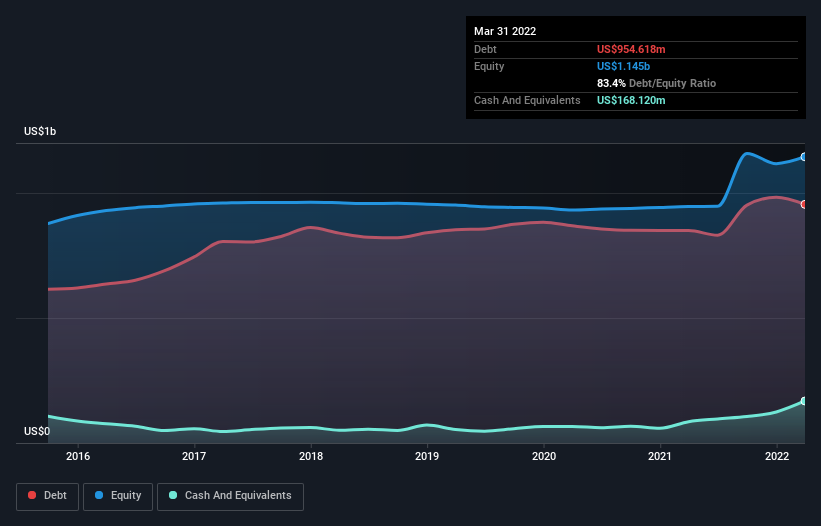- United States
- /
- Oil and Gas
- /
- NYSE:NVGS
Here's Why Navigator Holdings (NYSE:NVGS) Can Manage Its Debt Responsibly
David Iben put it well when he said, 'Volatility is not a risk we care about. What we care about is avoiding the permanent loss of capital.' It's only natural to consider a company's balance sheet when you examine how risky it is, since debt is often involved when a business collapses. Importantly, Navigator Holdings Ltd. (NYSE:NVGS) does carry debt. But is this debt a concern to shareholders?
When Is Debt A Problem?
Debt is a tool to help businesses grow, but if a business is incapable of paying off its lenders, then it exists at their mercy. If things get really bad, the lenders can take control of the business. However, a more common (but still painful) scenario is that it has to raise new equity capital at a low price, thus permanently diluting shareholders. Having said that, the most common situation is where a company manages its debt reasonably well - and to its own advantage. When we think about a company's use of debt, we first look at cash and debt together.
View our latest analysis for Navigator Holdings
What Is Navigator Holdings's Net Debt?
The image below, which you can click on for greater detail, shows that at March 2022 Navigator Holdings had debt of US$954.6m, up from US$850.1m in one year. However, it does have US$168.1m in cash offsetting this, leading to net debt of about US$786.5m.

How Healthy Is Navigator Holdings' Balance Sheet?
According to the last reported balance sheet, Navigator Holdings had liabilities of US$223.4m due within 12 months, and liabilities of US$797.0m due beyond 12 months. On the other hand, it had cash of US$168.1m and US$59.9m worth of receivables due within a year. So its liabilities total US$792.4m more than the combination of its cash and short-term receivables.
This is a mountain of leverage relative to its market capitalization of US$899.0m. This suggests shareholders would be heavily diluted if the company needed to shore up its balance sheet in a hurry.
We use two main ratios to inform us about debt levels relative to earnings. The first is net debt divided by earnings before interest, tax, depreciation, and amortization (EBITDA), while the second is how many times its earnings before interest and tax (EBIT) covers its interest expense (or its interest cover, for short). The advantage of this approach is that we take into account both the absolute quantum of debt (with net debt to EBITDA) and the actual interest expenses associated with that debt (with its interest cover ratio).
Navigator Holdings has a rather high debt to EBITDA ratio of 5.1 which suggests a meaningful debt load. But the good news is that it boasts fairly comforting interest cover of 2.6 times, suggesting it can responsibly service its obligations. The good news is that Navigator Holdings grew its EBIT a smooth 47% over the last twelve months. Like the milk of human kindness that sort of growth increases resilience, making the company more capable of managing debt. There's no doubt that we learn most about debt from the balance sheet. But ultimately the future profitability of the business will decide if Navigator Holdings can strengthen its balance sheet over time. So if you're focused on the future you can check out this free report showing analyst profit forecasts.
Finally, while the tax-man may adore accounting profits, lenders only accept cold hard cash. So it's worth checking how much of that EBIT is backed by free cash flow. Happily for any shareholders, Navigator Holdings actually produced more free cash flow than EBIT over the last three years. There's nothing better than incoming cash when it comes to staying in your lenders' good graces.
Our View
Both Navigator Holdings's ability to to convert EBIT to free cash flow and its EBIT growth rate gave us comfort that it can handle its debt. In contrast, our confidence was undermined by its apparent struggle handle its debt, based on its EBITDA,. When we consider all the factors mentioned above, we do feel a bit cautious about Navigator Holdings's use of debt. While we appreciate debt can enhance returns on equity, we'd suggest that shareholders keep close watch on its debt levels, lest they increase. The balance sheet is clearly the area to focus on when you are analysing debt. But ultimately, every company can contain risks that exist outside of the balance sheet. Be aware that Navigator Holdings is showing 2 warning signs in our investment analysis , and 1 of those doesn't sit too well with us...
Of course, if you're the type of investor who prefers buying stocks without the burden of debt, then don't hesitate to discover our exclusive list of net cash growth stocks, today.
Valuation is complex, but we're here to simplify it.
Discover if Navigator Holdings might be undervalued or overvalued with our detailed analysis, featuring fair value estimates, potential risks, dividends, insider trades, and its financial condition.
Access Free AnalysisHave feedback on this article? Concerned about the content? Get in touch with us directly. Alternatively, email editorial-team (at) simplywallst.com.
This article by Simply Wall St is general in nature. We provide commentary based on historical data and analyst forecasts only using an unbiased methodology and our articles are not intended to be financial advice. It does not constitute a recommendation to buy or sell any stock, and does not take account of your objectives, or your financial situation. We aim to bring you long-term focused analysis driven by fundamental data. Note that our analysis may not factor in the latest price-sensitive company announcements or qualitative material. Simply Wall St has no position in any stocks mentioned.
About NYSE:NVGS
Navigator Holdings
Owns and operates a fleet of liquefied gas carriers worldwide.
Good value with proven track record.
Similar Companies
Market Insights
Community Narratives




